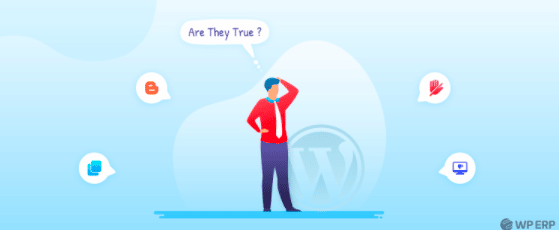When it comes to choosing the right set of tools and techniques for your website, one needs to be decisive because it affects the success of your site. This also includes the need to bury off some WordPress myths that might affect your strategy and success.
Undoubtedly, WordPress is one of the most popular, safe, and stable CMS (Content Management System) available in the market. Packed with the most powerful features, it’s currently powering 28% of websites on the internet and provides value to not only to your business but to your customers as well. Plus the support it offers is just phenomenal.
Hundreds of thousands of companies offer WordPress development services. It’s certainly one of the best CMS platforms that plays a significant role in the success of your site. It offers all those necessary features that you require to improve your user-experience to the next level.
WordPress has a good reputation, yet there are others who presume that it has shoddy functionality and quality. The majority of the population seems to agree that security is tough and impenetrable, while some contend that it is impossible to utilise. While these statements can be entertaining, in fact, they couldn’t be further from the truth.
Today in this post, we’re going to set the record straight. Here we’ll explain the origins of 5 commonly accepted WordPress misconceptions. Then, we’ll prove that all of these statements are untrue.
So without any further ado let’s begin!
5 Common WordPress myths people still believe in
WordPress is only for bloggers
Well, we don’t deny the fact that initially WordPress was created as a blogging platform. Over the time it evolved and grew and today’s it’s one of the most robust content management systems.
As we already told you WordPress powering over 26% of websites on the internet, however, not all of these websites are personal blogs. In order to serve diverse niches, it is very imperative that we have distinct WordPress-based websites out there, especially since the CMS has become so popular for providing all of the attractive features.
With custom pages, post types, plugins, addons, and widgets among other popular features, to power a list of online hits like Time, ViralNova, CNN, Harvard Law School, TechCrunch, SONY, eBay, Mozilla Firefox, SONY, and Microsoft, you may use WordPress’s extendable functionality.
Are these blogs written by individuals, or is there an editorial team involved? This one, we predict, is correct. As it happens, several of these names own websites that bring in a lot of traffic, so we’re very certain that this is the next myth.
WordPress is unscalable
We don’t get this one, do people believe in this myth because WordPress is FREE or a Community Project that came out on the surface out of the blue, well, you’ll see a lot of people questioning and commenting on the scalability of WordPress.
Users often ask questions like, How will my site hold up with increased traffic? What aspects of the system will diminish in the event of a traffic spike? When you gain popularity, will WordPress come tumbling down around you?
An effective word of advice would be to inform your customers that, while WordPress may have started out as a platform for blogging, it is most commonly used as a content management system (CMS). That is not true. Even the biggest businesses are hoping to acquire a slice of the WordPress pie.
No matter how many people visit your site or what the traffic spikes are, that has nothing to do with WordPress. Generally, WordPress is happy to host any size or level of traffic as long as you have enough server resources, such as the WPEngine Stacks available.
WordPress is not secured
Therefore, is there any programme, not even the tiniest shred of a doubt, that is totally secure? When trying to break into WordPress, hackers will go for the tiniest of security flaws in any piece of software, not just WordPress. Attacks on WordPress happen because of sheer volume, not because it’s prone to security vulnerabilities.
However, without the monthly security and core upgrades, the Internet would be a scene of total chaos right now. Every other day, sites would be lost left, right, and centre. Massive losses would occur, and the internet would come to a halt.
However, WordPress has been on the web for more than 10 years, and it’s constantly expanding, improving, and becoming more secure every day. Our beloved CMS grows thanks to contributions from the incredibly kind WordPress community.
When you use the latest versions of WordPress, you get new and improved functionality while also facing higher security standards such as the heightened password security introduced in WordPress 4.3 “Billie.” iThemes Security and others may increase the security of your WordPress site.
As things stand, your WordPress site’s security depends on you, as much as your important content does. To be safe, you must always maintain your WordPress core, plugins and themes up to date. Finally, set up regular and comprehensive site backups, as hackers may attack at any time.
WordPress doesn’t offer customer support
Most software companies follow this process. You have a need for something. You resort to a well-known firm, and they provide you with paid software that you find for yourself. If you have difficulties with their programme, please contact the company’s support team and you will be fixed.
While WordPress doesn’t have a single, proprietary owner, nobody pays to use it, and when you’re locked in…well, you’re locked in. Wrong.
The WordPress community consists of designers, developers, bloggers, translators, customer support representatives and more, who have put in tremendous amounts of time and effort to create the WordPress Codex; a very thorough and unparalleled documentation resource like no other. What’s more, WordPress offers an active forum where members of the community come to talk with one other.
You’ll be surprised how quickly you’ll obtain help with WordPress issues and maintenance service providers, plus the availability of independent service businesses, service providers, and freelance workers.
WordPress is inappropriate for eCommerce
Does “CMS” have to be spoken constantly in order for you to realise how versatile WordPress is? It is hard to envision how you might utilise WordPress to develop an ecommerce site when WordPress was first being created.
Previously, creating an e-store with WordPress was difficult, but now several frameworks and WordPress ecommerce plugins are available, you can use WordPress plugins like Woocommerce, Easy Digital Downloads, and WP eCommerce, and Easy Digital to build a fully functional WordPress eCommerce store
Setting up and using an online store using WordPress is truly a pleasant experience. In actuality, most of the bespoke ecommerce platforms that are designed particularly for these websites aren’t able to compete with WordPress as it is. The ecommerce site builder WordPress? No one could have predicted this!
Conclusion
Don’t you dare to get fooled by these myths! By every passing day, WordPress is only becoming more powerful,stable and secure.
Now that you have learned how these myths are unreal, it’s time to go and check out the platform yourself. Go and take a look at all the astounding features it offers and start planning how you can use the platform to create your online presence efficiently.
We hope this post was of great help to you. Thank you for reading!






